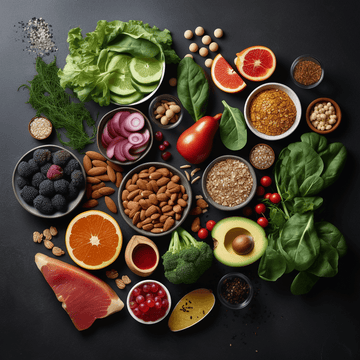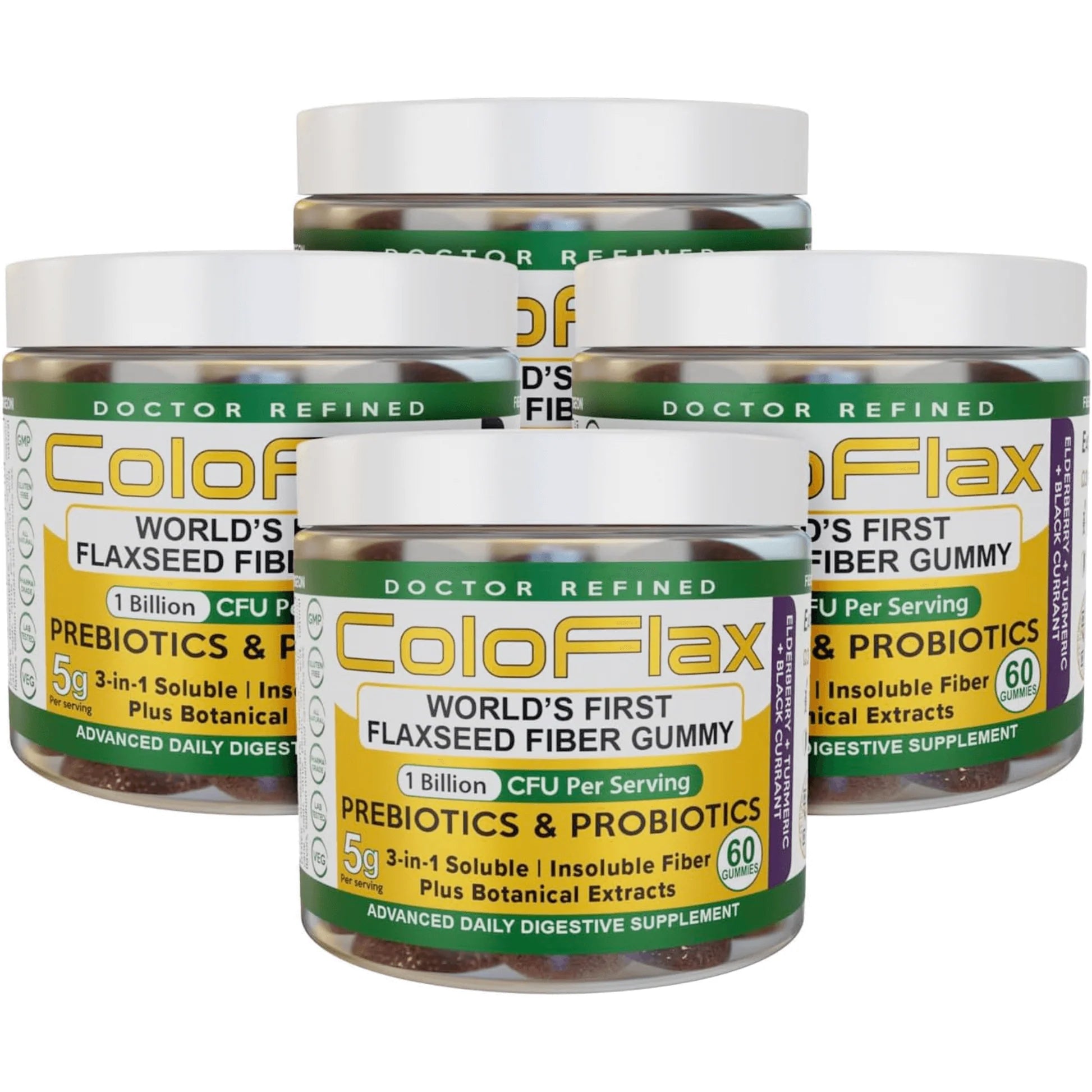You probably know that a high-fiber diet is best if you want to maintain optimal gut health. But there’s more to digestive health than fiber. You also need to consider essential fatty acids, minerals, vitamins, fluid intake, saturated fat vs unsaturated fat, probiotics, prebiotics, and more.
There’s a lot going on, and it’s unreasonable to expect someone to piece together the perfect gut diet based on all of these factors. It would also result in some pretty bland-tasting dishes, not to mention some hard-to-find ingredients and a mishmash of global cuisines.
So, let’s keep things simple—of the most popular global diets, including intermittent fasting, Mediterranean diet, and keto, which is best for gut health?
The Second Best Diet for Gut Health: The Vegan Diet
You might expect the vegan or “plant-based” diet to be top of this list, and it’s a reasonable assumption to make. We don’t think it’s that deserving (more on that below), but it’s certainly a great option for keeping your digestion in check.
Saturated fat is kept to a minimum and monounsaturated fat consumption is high. Vegan diets are also high in fiber, vitamins, minerals, and antioxidants, as all of these are found in abundance throughout nature.
Of course, not all vegan food is healthy, and it’s a mistake to assume otherwise. Sugar is vegan, as are crusty baguettes slathered with preserves, French fries cooked in vegetable oil, and countless processed meat alternatives designed to look and taste like the real thing. But the great thing about plant-based diets is that they force you to think about what you’re eating and to make smarter decisions.
Vegans can’t simply grab a burger from the local fast food chain, throw some meat between two slices of bread, or stick a frozen pizza in the oven.
The average American diet is severely lacking in fiber, but the average vegan gets more than their fill. For instance, let’s compare what could be seen as a “typical” American diet to a vegan alternative:
Typical diet:
- Breakfast: Sugary cereal with milk
- Meal 1: Mac n Cheese, Chicken Wings
- Meal 2: Meatloaf with mashed potato and a serving of vegetables
- Snacks: Sugary soda, candy bar, chips
The above contains less than 15g of fiber, as well as very high levels of saturated fat. It would be inaccurate to say that this is the type of diet that every American eats every day, but the high-sugar, high-sodium, and high meat/dairy are reflective of the average diet.
Now let’s look at a vegan alternative:
- Breakfast: Avocado toast with soy-based bacon
- Meal 1: Wholegrain pasta with tomato sauce, vegetables, and a side salad
- Meal 2: Bean and veggie tacos
- Snacks: Popcorn, fruit
This vegan alternative is lower in saturated fat and contains anywhere from 25g to 40g of fiber, depending on the fruits and vegetables. It’s also higher in healthy fats, vitamins, and minerals, all of which contribute to a healthy, balanced diet.
The Best Diet for Gut Health: The Mediterranean Diet
In our opinion, and the opinion of many digestive health experts, the Mediterranean diet is the best for overall gut health. It is also considered to be the best for cardiovascular health and general longevity.
Studies suggest that the benefits lie in the potent antioxidant effects of this diet. But it goes much further than that. It’s also high in fiber and unsaturated fat and contains an abundance of vitamins and minerals.(1)
It has been shown to help with weight loss, heart disease risk, and more.(2) (3)
So, what is the Mediterranean diet? Well, as the name suggests, it’s the typical diet consumed throughout the Mediterranean, including Greece and Italy.
It is drastically different from the typical US diet and even uses a different food pyramid. Dairy is uncommon and usually restricted to small amounts of cheese and yogurt. Processed meat and fast food are rarely consumed and the diet is high in fresh fruits and vegetables, including lots of legumes, nuts, and seeds.
More importantly, it’s a diet that includes many delicious dishes and popular meals, including pasta dishes, lentil dishes, and the iconic Greek salad.
Use plenty of herbs, don’t be stingy with the olive oil, and don’t dismiss grains. If you’ve ever spent time in Italy, Greece, or Spain, you’ll know that they are big fans of bread, pasta, and other grain-based foods, so there’s no need to cut these out.
The Mediterranean diet contains about 2 to 3 servings of fatty fish a week. They love their fish in the med, which is no surprise considering the proximity to the Mediterranean Sea. So, get your fill of mackerel, salmon, and trout, all of which are high in omega-3 fatty acids. Fish and seafood are high in protein and minerals and low in saturated fat, so don’t restrict yourself to fatty fish.
More Great Diets For Gut Health
You don’t need to be 100% plant-based or fully adopt the Mediterranean diet to reap the digestive benefits. You can enjoy the occasional boiled egg or cheesy mac n cheese and still feel great. If you find it difficult to adhere strictly to any single diet, just add more fiber to your diet and try to swap saturated fat for unsaturated fat where possible.
Other diets to consider include vegetarianism. As with the vegan diet, it’s high in plant-based foods. The problem is that it’s very easy to get lazy on this diet, as many unhealthy “junk” foods, including cheese, fries, chips, fried eggs, cream, and butter are vegetarian.
How Other Diets Impact Your Digestive Health
The diets mentioned above are some of the best for optimizing gut health, but that doesn’t mean that all others are terrible. There are still many other diets that can offer general health and digestive health benefits.
Here are a few of the most popular:
Keto Diet
The keto diet has become very popular in recent years and research suggests it could help with weight loss and other conditions. It has been suggested as a possible treatment for metabolic disorders and obesity and was actually developed to treat epilepsy. But what about gut health?
Well, that’s where it falls a little flat. There is some evidence to say that it can be beneficial for people with irritable bowel syndrome, but many high-fiber foods are restricted on the keto diet and it’s very fat-focused.
Regardless of what you might think about its weight loss benefits, its impact on energy levels, or its cardiovascular effects, the keto diet doesn’t compare to plant-based and Mediterranean diets when it comes to gut health.
Intermittent Fasting
Intermittent fasting is a diet that revolves around regular fasting periods. The idea is that you eat all of your calories within a specific window and then eat little or no food outside of that window.
In theory, it could help with gut health, as the fasting periods give your gut a break. The problem is that it’s not really a fixed diet that outlines specific food groups or meals. In reality, it doesn’t matter what you eat, as long as you stick to those specified feeding and fasting windows.
Keep your fiber levels high and watch out for your protein intake. Ensuring you get plenty of fiber and protein will benefit your gut and ensure that you stay fuller for longer.
It’s also worth noting that fasting diets like this can be beneficial for acid reflux/GERD. Take the 8/16 diet as an example. Rather than requiring you to fast for entire days, it merely tasks you with eating within an 8-hour window and then fasting for 16 hours. In doing so, you won’t be going to bed with a full stomach, which is one of the biggest triggers for acid reflux.
The Carnivore Diet
The carnivore diet is a meat-focused diet that dispatches plant-based foods and focuses on meat, fish, and meat products. Many proponents claim that it makes them stronger, fitter, and healthier, and that it’s the “natural” diet for humans, even though we are omnivores and not carnivores.
The jury is out on whether or not the above claims are true, but for every advocate who claims that it’s beneficial, there are several detractors concerned about its effects on the gut and heart.
There’s very little fiber in the carnivore diet. More importantly, it lacks the diverse range of nutrients, probiotics, prebiotics, and enzymes found in plants.
In 2014, a gut health study looked at the effects of a carnivorous diet vs a plant-based diet on the gut microbiome. It found that those eating a carnivorous diet experienced a sharp increase in inflammatory bacteria, as well as the bacteria responsible for inflammatory bowel diseases.
There was also an increase in antibiotic resistance and bile salts.
So, while the carnivorous diet might work for some people, it’s not the best diet if you’re struggling with digestive issues and need a complete solution.(4)
The Cabbage Soup Diet
The cabbage soup diet is exactly what it sounds like—a diet that primarily consists of cabbage soup. Cabbage is very good for your digestive tract as it is rich in fiber and helpful nutrients.
The average head of cabbage contains about a third of your daily potassium needs, as well as a massive 18g of fiber, which is more than most Americans eat in a day. Add nearly 10g protein, 30% vitamin C, 45% vitamin B6, and more than 4x your vitamin C requirements to the mix, and you have an excellent food choice.
It’s also low in fat and calories, so you can eat a lot of it without packing on the pounds.
But it’s far from a panacea.
This diet is mainly used as part of a weight loss program. It’s more about calorie restriction than reaping the benefits of cabbage. Some claim to have lost up to 10 pounds after just a week of this diet, and that kind of rapid weight loss is rarely advised.
You should definitely consider adding cabbage to your diet. And if you want a meal that is low-calorie and filling, cabbage soup is ideal. It’s also cheap, which is an added benefit in these difficult times. But it’s not something that you should be eating for every meal.
Optimal gut health is all about diversification. Take inspiration from the Mediterranean diet. Rather than sticking with simple foods and eating them until you’re sick of them, add lots of colorful fruit and veg to your diet, swap processed meat for fatty fish, drink plenty water and tea, and keep sugary treats and fast food to a minimum.






